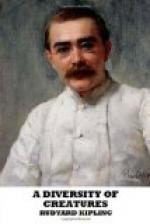We ordered our car a few minutes later. As Woodhouse, Ollyett and I were getting in, Sir Thomas Ingell, Bart., M.P., came out of the Hall of Justice across the square and mounted his horse. I have sometimes thought that if he had gone in silence he might even then have been saved, but as he settled himself in the saddle he caught sight of us and must needs shout: ’Not off yet? You’d better get away and you’d better be careful.’ At that moment Pallant, who had been buying picture-postcards, came out of the inn, took Sir Thomas’s eye and very leisurely entered the car. It seemed to me that for one instant there was a shade of uneasiness on the baronet’s grey-whiskered face.
‘I hope,’ said Woodhouse after several miles, ‘I hope he’s a widower.’
‘Yes,’ said Pallant. ’For his poor, dear wife’s sake I hope that, very much indeed. I suppose he didn’t see me in Court. Oh, here’s the parish history of Huckley written by the Rector and here’s your share of the picture-postcards. Are we all dining with this Mr. Masquerier to-night?’
‘Yes!’ said we all.
* * * * *
If Woodhouse knew nothing of journalism, young Ollyett, who had graduated in a hard school, knew a good deal. Our halfpenny evening paper, which we will call The Bun to distinguish her from her prosperous morning sister, The Cake, was not only diseased but corrupt. We found this out when a man brought us the prospectus of a new oil-field and demanded sub-leaders on its prosperity. Ollyett talked pure Brasenose to him for three minutes. Otherwise he spoke and wrote trade-English—a toothsome amalgam of Americanisms and epigrams. But though the slang changes the game never alters, and Ollyett and I and, in the end, some others enjoyed it immensely. It was weeks ere we could see the wood for the trees, but so soon as the staff realised that they had proprietors who backed them right or wrong, and specially when they were wrong (which is the sole secret of journalism), and that their fate did not hang on any passing owner’s passing mood, they did miracles.
But we did not neglect Huckley. As Ollyett said our first care was to create an ‘arresting atmosphere’ round it. He used to visit the village of week-ends, on a motor-bicycle with a side-car; for which reason I left the actual place alone and dealt with it in the abstract. Yet it was I who drew first blood. Two inhabitants of Huckley wrote to contradict a small, quite solid paragraph in The Bun that a hoopoe had been seen at Huckley and had, ’of course, been shot by the local sportsmen.’ There was some heat in their letters, both of which we published. Our version of how the hoopoe got his crest from King Solomon was, I grieve to say, so inaccurate that the Rector himself—no sportsman as he pointed out, but a lover of accuracy—wrote to us to correct it. We gave his letter good space and thanked him.
‘This priest is going to be useful,’ said Ollyett. ’He has the impartial mind. I shall vitalise him.’




